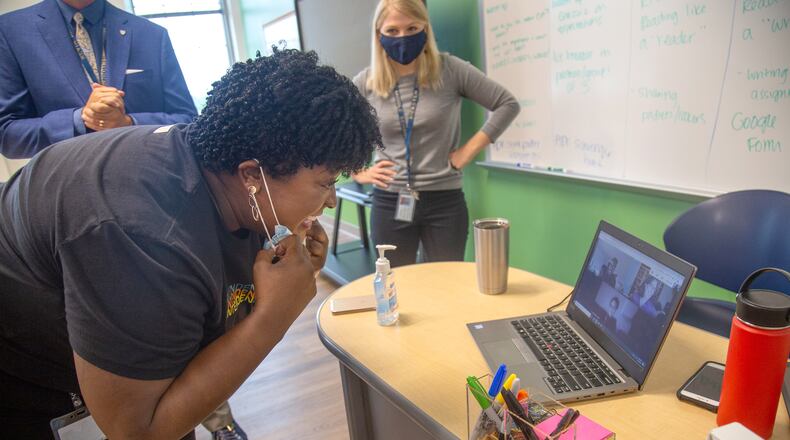Many Georgia parents want their children to return to face-to-face classes. In their district’s plan to start reopening its buildings later this month, some Atlanta school board members asked parents to consider whether their children need to return.
Board members asked parents to weigh whether their child’s learning needs were critical enough to claim a seat in reopening classrooms. Families had to make the decision — and distinction — by Monday, and it was not easy, based on the public discussion among many Atlanta parents.
The need vs. want metric was not an official Atlanta Public Schools stance, but more of a moral scale suggested by board members seeking to appease parent fears around putting teachers at risk of COVID-19 and enabling social distancing within classrooms.
Addressing parent concern about the safety of teachers, board member Cynthia Briscoe Brown said, “The best way to support that would be for your child to continue virtually. Because the fewer teachers we need in the classroom, the more stay virtual. Please do consider carefully not only your individual family’s needs, but take into account the larger community.”
Atlanta’s plan offered families three options:
- Continue virtual learning with their home school.
- Return to face-to-face learning on Oct. 26, four days a week for students with disabilities and pre-K through fifth grade. On Nov. 16, grades 6 to 12 return to buildings.
- Join the Atlanta Virtual Academy and remain online for the school year.
During a virtual town hall Thursday evening, Atlanta Superintendent Lisa Herring said public health data will determine whether APS can open its doors. A key factor: a downward trend in new COVID-19 diagnoses. “If that data does not show a favorable trend, we will remain virtual,” said Herring, citing Oct. 16 as the date when that decision will be announced.
When APS reopens its buildings, Herring emphasized it will not look like the classrooms and hallways of old. “I cannot tell you that you can know in advance you will have the same teacher. I cannot tell you that there will be classrooms where it is just the teacher and the students and no devices. It is likely that teachers could teach simultaneously virtually and face-to-face," said Herring. “It is not the setting where we see everyone moving freely, as we have historically been used to.”
As Herring spoke, hundreds of parents posted questions and comments. Among them: “If you need parents who can keep their kids home to do so to make more room for our kids who need in-person learning most, please just make that request clearly.”
In a virtual meeting with parents sponsored by the Council of Intown Neighborhoods and Schools prior to the town hall, APS board members Briscoe Brown, Leslie Grant and Michelle Olympiadis shared their measures of need vs. want.
“With respect to the options, I really think the message needs to be heard that this is about need; if your child needs to go back to in-person and not if you want to go back to in-person. I know everyone wants to go back to school. I know my children want to go back to school,” said Olympiadis. “It is a family decision, but I really hope families think of this as the need of their child.”
Parents expressed angst about whether their own need was pressing enough to send their children back and how determining need vs. want could prove divisive. Who are Atlanta’s most vulnerable students? Olympiadis suggested students with identified learning challenges and “children suffering with anxiety and depression who need to be in a different environment because they are not thriving through a virtual environment.”
She also shared her own personal thought process. “Is virtual ideal for my three children? No, I want my children to go back to school. But is there truly a need for them to go back? No, there is not. We will stay the semester through virtual learning as a family. Let me be clear. When you do decide to make your decision on our survey, it will be binding through the semester.” (The current semester will end Jan. 15, and the new semester will start Jan. 19, after Martin Luther King Jr. Day.)
Parents told board members the unknowns around returning made the decision hard. Will their children’s online teacher become their classroom teacher? What if APS has too many kids returning and schools can’t maintain recommended social distancing? How will teachers handle both in-person and virtual students at the same time, a task that educators in other districts say is exhausting?
“There is no way to know what it’s going to look like when people go back," said Grant. “If everyone decides to send their child back in person — which I really don’t anticipate is going to happen, but it could — the accommodations in terms of COVID and distancing and spacing are not going to accommodate a full school of children. I hope it doesn’t happen because I just don’t think that’s a smart thing to accommodate right now. But, if it does, there will clearly have to be alternate plans made about how that physically looks."
APS teachers filled out intent forms last month, but that was under a proposal bringing fewer grades back for two days a week. Some teachers are not happy about the updated reopening blueprint. As a teacher told me, “Very few teachers I know are OK going back under this new plan.”
About the Author
Keep Reading
The Latest
Featured



